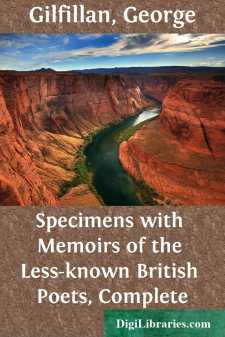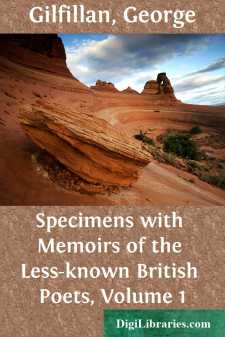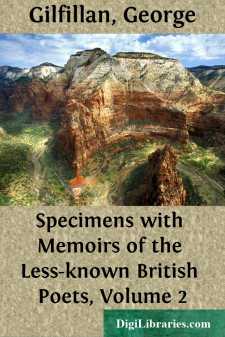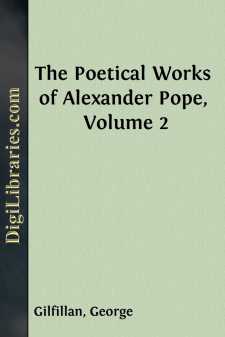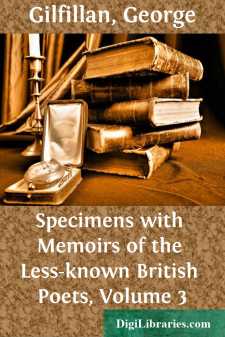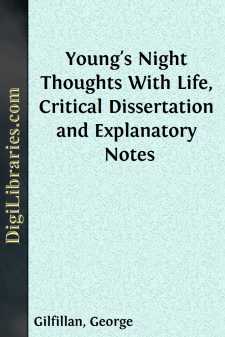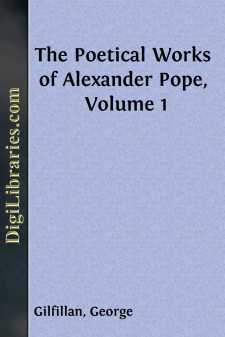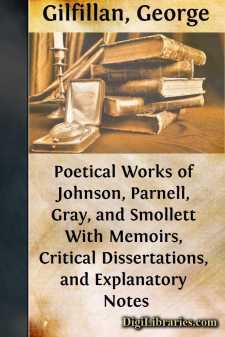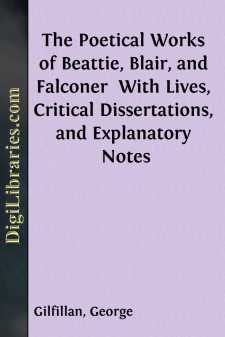Categories
- Antiques & Collectibles 13
- Architecture 36
- Art 48
- Bibles 22
- Biography & Autobiography 813
- Body, Mind & Spirit 142
- Business & Economics 28
- Children's Books 17
- Children's Fiction 14
- Computers 4
- Cooking 94
- Crafts & Hobbies 4
- Drama 346
- Education 46
- Family & Relationships 57
- Fiction 11829
- Games 19
- Gardening 17
- Health & Fitness 34
- History 1377
- House & Home 1
- Humor 147
- Juvenile Fiction 1873
- Juvenile Nonfiction 202
- Language Arts & Disciplines 88
- Law 16
- Literary Collections 686
- Literary Criticism 179
- Mathematics 13
- Medical 41
- Music 40
- Nature 179
- Non-Classifiable 1768
- Performing Arts 7
- Periodicals 1453
- Philosophy 64
- Photography 2
- Poetry 896
- Political Science 203
- Psychology 42
- Reference 154
- Religion 513
- Science 126
- Self-Help 84
- Social Science 81
- Sports & Recreation 34
- Study Aids 3
- Technology & Engineering 59
- Transportation 23
- Travel 463
- True Crime 29
George Gilfillan
George Gilfillan (1813-1878) was a Scottish poet, literary critic, and clergyman known for his passionate and often controversial critiques of contemporary literature and authors. He was a key figure in the Scottish literary revival of the 19th century and significantly influenced writers such as William McGonagall and Alexander Smith. Gilfillan's most notable works include "Gallery of Literary Portraits" and "Bards of the Bible," which showcased his extensive knowledge and appreciation of literature and theology.
Author's Books:
Sort by:
by:
George Gilfillan
INTRODUCTORY ESSAY We propose to introduce our 'Specimens' by a short Essay on the Origin and Progress of English Poetry on to the days of Chaucer and of Gower. Having called, in conjunction with many other critics, Chaucer 'the Father of English Poetry,' to seek to go back further may seem like pursuing antenatal researches. But while Chaucer was the sun, a certain glimmering dawn...
more...
by:
George Gilfillan
We propose to introduce our 'Specimens' by a short Essay on the Origin and Progress of English Poetry on to the days of Chaucer and of Gower. Having called, in conjunction with many other critics, Chaucer 'the Father of English Poetry,' to seek to go back further may seem like pursuing antenatal researches. But while Chaucer was the sun, a certain glimmering dawn had gone before...
more...
by:
George Gilfillan
WILLIAM HABINGTON. This poet might have been expected to have belonged to the 'Spasmodic school,' judging by his parental antecedents. His father was accused of having a share in Babington's conspiracy, but was released because he was godson to Queen Elizabeth. Soon after, however, he was imprisoned a second time, and condemned to death on the charge of having concealed some of the...
more...
by:
George Gilfillan
THE GENIUS AND POETRY OF POPE. Few poets during their lifetime have been at once so much admired and so much abused as Pope. Some writers, destined to oblivion in after-ages, have been loaded with laurels in their own time; while others, on whom Fame was one day to "wait like a menial," have gone to the grave neglected, if not decried and depreciated. But it was the fate of Pope to combine in...
more...
by:
George Gilfillan
SIR CHARLES SEDLEY. Sedley was one of those characters who exert a personal fascination over their own age without leaving any works behind them to perpetuate the charm to posterity. He was the son of Sir John Sedley of Aylesford, in Kent, and was born in 1639. When the Restoration took place he repaired to London, and plunged into all the licence of the time, shedding, however, over the putrid pool...
more...
by:
George Gilfillan
ON THE LIFE AND POETIC GENIUS OF EDWARD YOUNG. Between the period of George Herbert, and that of Edward Young, some singular changes had taken place in British poetry as well as in British manners, politics, and religion. There had passed over the land the thunderstorm of the Puritanic Revolt, which had first clouded and then cleared, for a season, the intellectual and moral horizon. The effect of this...
more...
by:
George Gilfillan
LIFE OF ALEXANDER POPE Alexander Pope was born in Lombard Street, London, on the 21st of May 1688—the year of the Revolution. His father was a linen-merchant, in thriving circumstances, and said to have noble blood in his veins. His mother was Edith or Editha Turner, daughter of William Turner, Esq., of York. Mr Carruthers, in his excellent Life of the Poet, mentions that there was an Alexander Pope,...
more...
by:
George Gilfillan
THE POETICAL WORKS OF SAMUEL JOHNSON. THE LIFE OF SAMUEL JOHNSON. We feel considerable trepidation in beginning a life of Johnson, not so much on account of the magnitude of the man—for in Milton, and one or two others, we have already met his match—but on account of the fact that the field has been so thoroughly exhausted by former writers. It is in the shadow of Boswell, the best of all...
more...
by:
George Gilfillan
The Life and Poetry of James Beattie James Beattie, the author of the Minstrel was born at Laurencekirk, in the county of Kincardineshire—a village situated in that beautiful trough of land called the Howe of the Mearns, and surmounted by the ridge of the Garvock Hills, which divide it from the German Ocean—on the 25th day of October 1735. His father, who was a small farmer and shopkeeper, and who...
more...


